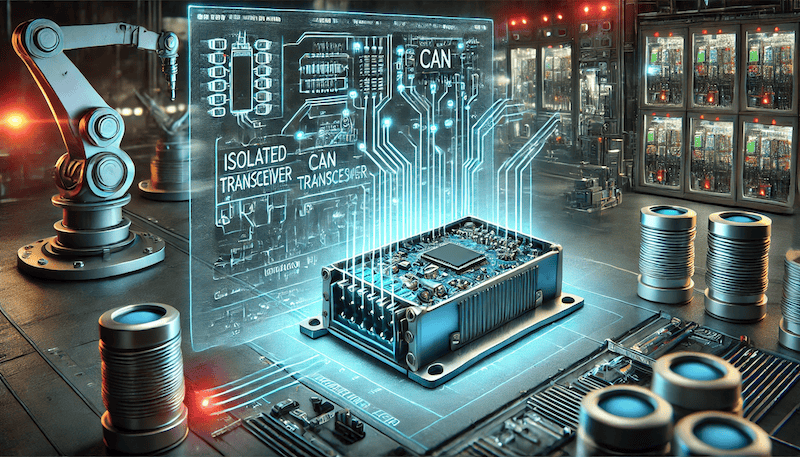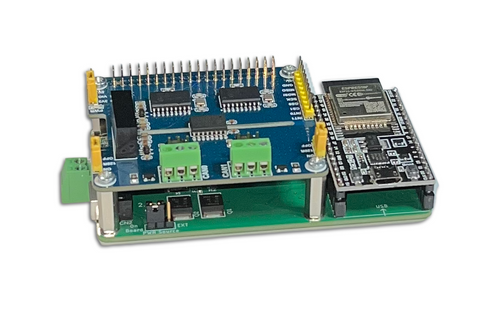Blog
Recent Posts
Optimized Design: Enhancing CAN Transceiver Isolation for Reliable Fieldbus Networks
Posted by on
 The Controller Area Network (CAN) bus has become a staple in industrial automation, process control, medical systems, and manufacturing due to its high noise immunity and error-handling capabilities. As CAN networks often span long distances and connect multiple systems, isolating the bus from individual systems is critical. Isolation prevents electrical transients, eliminates ground loops, and enhances overall system reliability. This article explores CAN’s physical layer, the necessity of system isolation, and the functional role of isolated CAN transceivers.
The Controller Area Network (CAN) bus has become a staple in industrial automation, process control, medical systems, and manufacturing due to its high noise immunity and error-handling capabilities. As CAN networks often span long distances and connect multiple systems, isolating the bus from individual systems is critical. Isolation prevents electrical transients, eliminates ground loops, and enhances overall system reliability. This article explores CAN’s physical layer, the necessity of system isolation, and the functional role of isolated CAN transceivers.
CAN Bus Protocol and Arbitration
CAN operates as a two-wire serial communication bus standardized under ISO 11898. It employs a carrier-sense multiple access (CSMA) mechanism with collision detection and message priority arbitration (CD+AMP). Each node monitors the bus before transmission. If multiple nodes attempt transmission simultaneously, arbitration is resolved through dominant (logic low) and recessive (logic high) bit priorities.
Messages are structured as data frames, encapsulating identification, control, data, error-checking, and acknowledgment fields. The protocol’s arbitration ensures that high-priority messages gain immediate access without data loss.
Signal Levels and Cable Considerations
CAN transceivers utilize differential signaling with open-drain output stages. During dominant transmission, both output transistors engage, creating a voltage differential. In recessive mode, pull-up resistors maintain a balanced voltage level.
Cable length directly impacts data rate. ISO11898 specifies a maximum of 40 meters at 1 Mbps, with longer distances possible at reduced data rates. Twisted-pair cables with 120Ω impedance are standard, and termination resistors at each end mitigate reflections. Stub lengths should be minimized to prevent signal degradation.
Need for Isolation
Industrial CAN networks are susceptible to noise from ground loops and electrical surges. Ground loops arise when nodes at different locations reference local grounds, causing potential differences and unintended currents. Electrical surges, induced by switching equipment, electrostatic discharge (ESD), or lightning strikes, can compromise network integrity.
Galvanic isolation protects against these issues by decoupling the network from node circuitry. Modern digital isolators achieve up to 4 kV of peak isolation and transient immunity up to 50 kV/µs, ensuring reliable operation.
Digital Isolators and Isolated CAN Transceivers
Digital isolators employ capacitive isolation barriers to transfer signals across nodes. High-speed channels (100 kbps to 150 Mbps) transmit pulses directly, while low-speed channels (
Traditional digital isolators lack differential signaling, requiring placement on the single-ended side of a CAN transceiver. Modern isolated CAN transceivers integrate isolation barriers with enhanced transceiver capabilities, including:
-
Over-temperature and over-voltage protection (-27V to 40V)
-
Common-mode range of -12V to 12V
-
Voltage transient tolerance from -200V to 200V
-
Dominant-time-out circuits to prevent network blockage due to hardware or software failures
Conclusion
The introduction of fully integrated isolated CAN transceivers significantly improves network protection against electrical transients. Texas Instruments and other manufacturers offer robust digital isolators and transceivers that enhance CAN reliability in demanding applications.
By adopting isolated CAN transceivers, engineers can ensure more resilient and interference-free fieldbus designs for industrial and automation environments.
 ESP32 Development Board with Dual Isolated CAN Bus HAT
ESP32 Development Board with Dual Isolated CAN Bus HAT
The espBerry DevBoard seamlessly integrates the ESP32-DevKitC development board with any Raspberry Pi HAT via its onboard RPi-compatible 40-pin GPIO header. Rather than serving as a Raspberry Pi replacement, the espBerry enhances the ESP32’s functionality, leveraging the extensive ecosystem of RPi HATs and their diverse hardware options.
Designed for Internet of Things (IoT) applications, particularly those demanding wireless connectivity, the espBerry offers a powerful and flexible solution. Developers can easily utilize open-source code samples within the Arduino IDE, benefiting from its intuitive programming environment and extensive support. More information...
ESP32 Processor: Internal SJA 100 CAN Bus Controller
This post is an excerpt from our application note Controller Area Network (CAN) Development with ESP32.The ESP32 integrates a CAN Bus controller compatible with the NXP SJA1000. Thus, it is CAN 2.0B (ISO 11898, a.k.a. Classical CAN) specification-compliant.As with the SJA1000, the ESP32 CAN Bus controller provides only the data link layer and the physical layer [...]
ESP32 Processor with Internal SJA 1000 CAN Bus Controller
This post is an excerpt from our application note Controller Area Network (CAN) Development with ESP32. The ESP32 is a low-cost, low-power system-on-chip microcontroller with integrated WiFi and dual-mode Bluetooth. It employs a Tensilica Xtensa LX6 microprocessor in dual-core and single-core variations. It includes built-in antenna switches, RF balun, power amplifiers, low-noise receive amplifiers, filters, and power [...]
CAN Bus Shield for Arduino, Mbed Platform With Fault-Tolerant MAX33040E CAN Transceiver
The MAX33040Eshld shield evaluation kit by maxim integrated represents a demonstration and development platform for the MAX33040E CAN Bus transceiver. It serves as a standalone evaluation board and the Mbed or Arduino platform to communicate with a CAN Bus network. The board features test points to access critical signal pins of the transceiver. The MAX14931 digital isolator [...]
Industry's First CAN Bus Transceiver With Fault Detection, Diagnostic Evaluation, And Reporting
Maxim Integrated introduced its MAX33012E, a CAN Bus transceiver that improves CAN Bus reliability through integrated fault detection and reporting. Designers requiring extended uptime for industrial automation applications can accelerate troubleshooting and communicate across more extensive networks using the MAX33012E CAN Bus transceiver. The device was designed to enhance industrial system uptime for factory-floor networks. The MAX33012E represents [...]
CAN FD Controller With Integrated CAN Transceiver And SPI Interface
Texas Instruments has introduced their TCAN4550, a CAN FD stand-alone controller with integrated (on-chip) transceiver. The TCAN4550 represents an interface between a CAN Bus network and a host controller through a serial peripheral interface (18-MHz SPI).It supports the Classical CAN and the CAN FD data link layer. In addition, the chip comes with CAN FD transceiver functionality: differential [...]
Galvanically Isolated CAN Bus Transceivers Protect Networks Against Destructive Energy
High noise levels on a CAN bus network have the potential to destroy CAN bus transceivers. This noise originates mainly from two sources, ground loops and electrical line surges.Protecting a network against this destructive energy requires the galvanic isolation of the CAN bus system from other local node circuitry. For more information on Controller Area [...]
Controller Area Network (CAN) Transceiver Family Supports CAN FD (Flexible Data-Rate) Protocol
A family of Controller Area Network (CAN) transceivers including various automotive Grade 0 qualified parts is now available from Microchip Technology Inc. The ATA65XX family adds six devices to Microchip’s CAN portfolio.The family supports the recently established CAN FD (Flexible Data-rate) protocol for up to five Mbit/s communication speed and the new CAN PN (Partial Networking) standard for improved [...]
Industrial-Strength Full Or Half Duplex Isolated RS-485 Transceivers
Maxim Integrated released their MAX14853/MAX14855 and MAX14943/MAX14949 RS-485 transceivers that include a transformer driver and low drop out (LDO) regulator simplifies power and data isolated designs. The MAX14943 isolated RS-485/PROFIBUS DP transceiver, as well as the MAX14949 transceiver, each provide up to 80% efficiency at 150mA load. Available in full or half duplex isolated RS-485 transceivers, the family [...]
 Loading... Please wait...
Loading... Please wait...
